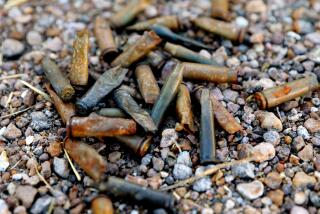Drug Czar Cites Both Successes, New Challenges : Latin America: Brown returns from trip to cocaine-producing countries praising efforts but saying more is needed.
WASHINGTON — Federal drug czar Lee P. Brown, returning from top-level meetings in Bolivia, Venezuela and Peru, on Tuesday claimed “positive developments” in the fight against drug production there, but the specifics he cited presented a mixed picture at best.
“Based on my visit, I can say that in the cocaine-producing countries, we have had some degree of success, which, in turn, is producing new challenges,” he told a news conference at the White House’s Office of National Drug Control Policy. He also said he found that the “political will to combat the narcotics problem exists.”
But in Bolivia, which now grows about 30% of the leaves from which cocaine is refined, more coca is being planted than is being eradicated, Brown said. Bolivia’s government “has never seriously enforced its own laws” against illegal coca production, feeding the belief among near-subsistence farmers that they can keep growing an important income-generating crop, he said.
Brown said that in discussions with Bolivian President Gonzalo Sanchez de Lozada, the chief executive repeatedly observed that there are no “silver bullet” solutions to the problem of coca leaf production. Brown said the Bolivian president would face “substantial political difficulties” if he ordered eradication of mature coca.
Nevertheless, “involuntary eradication of illegal coca must occur if we hope to convince farmers that coca is too risky a crop upon which to base their economic future,” Brown said, noting that he understands Sanchez de Lozada’s “predicament” but that he doesn’t think the president’s voluntary approach to the problem will work.
In 1994, about 2,600 acres of coca were eradicated in Bolivia, nearly all of it voluntarily, with farmers being paid to move to other crops. But at the same time, 5,000 acres of coca were planted, a Brown aide said.
At the State Department’s request, a stop in Colombia was dropped from Brown’s tour of cocaine-producing countries. Brown said he did not go there because of “internal problems,” presumably referring to allegations that President Ernesto Samper’s election campaign received substantial contributions from drug figures, charges that Samper has denied.
While Brown said he is “very encouraged” by Colombia’s arrest of six alleged leaders of the Cali cartel, he said the United States will be “watching closely” to see that they are punished “commensurate with the misery and despair and the death” they have caused.
In a related development, U.S government sources said contingency plans have been made to put several of the cartel figures on trial in the United States, where they also face charges, if Samper’s government is overthrown by the military or other means and the constitutional ban against extradition of Colombian nationals is suspended.
Brown was not asked about that possibility but noted, “We would love to have an extradition arrangement with Colombia.”
Sources said the planning would not be discussed openly for fear of signaling that the United States favors the replacement of Samper, which the sources deny.
Brown hailed Peru’s “substantial progress,” with U.S. assistance, in “destroying the air bridge” for flying cocaine base--the intermediate product made from coca leaves that is refined into cocaine--from Peru to Colombia. In the first six months of 1995, the number of drug flights from Peru to Colombia was 30% below that in the same period last year.
But offsetting this success, traffickers now are changing their route to fly over the largely uncontrolled airspace of western Brazil in transporting the base.
More to Read
Sign up for Essential California
The most important California stories and recommendations in your inbox every morning.
You may occasionally receive promotional content from the Los Angeles Times.










